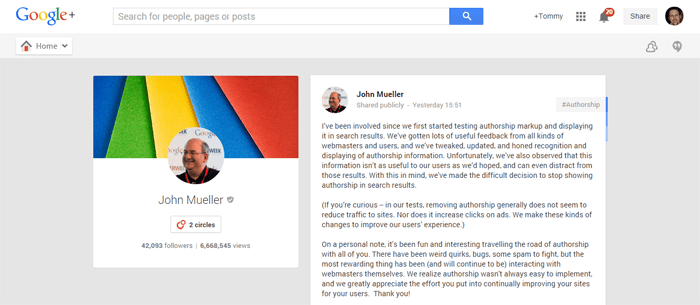In an unexpected development, Google’s John Mueller announced on Thursday August 28, 2014 via Google+ that the much discussed Google Authorship program was coming to an abrupt ending.
This was a huge announcement for the Search Engine Optimization community. Over the past few years, we have been beating the Authorship drum.
After all, it’s vision was to help minimize spam in the SERPs by tying authors to content.
Just last month, I shared my own personal ideas for where Google was heading with Author Authority during an on-site training session for one of my clients.
Given all the attention paid to link spam the past couple of years, I was convinced that Authorship is the better option to assessing penalties.
Apparently, I was wrong.
High Points of the Google Authorship Announcement
Let’s look at my shorthand version of the announcement itself, and the discussion that ensued on the G+post.
- Authorship will no longer show up in SERPs at all. After removing the photos in July, they’re removing it all now.
- This decision was made in order to improve the user experience.
- Rich snippets will remain in the SERPs by way of structured markup.
- Google+ posts will continue to show up in the SERPs for your connections on the social platform.
- Google has stopped using authorship data at all. They are no longer processing it for ranking or SERP display.
- Google+ links to your site will still hold value as they have in the past.
- Publisher markup is alive and well – this has no impact on publisher markup (some good news in my book)
- Authorship markup will no longer be supported in the Structured Data Testing Tool
- An “Author” is no longer a type of semantic entity. Stick a fork in it for all practical purposes.
What Does Google Authorship Elimination Mean?
The natural question then is what does this all mean? Why did they do it? Here’s my two-cents worth.
Harkening back to the beginning of this whole journey, Google+ and authorship as a whole were positioned as Google’s way to figure out Social Search.
With the major competitive social networks all blocking access to some or all of their information, Google had no choice but to strike out with their own platform.
Unfortunately, they were a bit late to the game. Adoption was slow, albeit growing in the past year.
My hunch is that the SERP photos were a ploy to get everyone enamored with the idea. It’s possible that was meant to be a temporary test in the first place.
When only some of us took the bait, they had to re-evaluate the approach based on real user data.
A couple of commenters online have suggested that markup was just a way to get links built to Google+, in order to push up its authority en masse.
While that conspiracy theory is interesting, I struggle to believe Google needed link juice that badly.
After all, their Top Level Domain (TLD) carries a PR9, and subdomains do get at least a portion of PR passthrough from the TLD.
The structured markup comment is the most intriguing to me.
Clearly, Google has surmised that other entities are more important to quality ranking and SERPs than authorship. In fact, we already have markup for a “Person” entity.
That includes additional markup for a range of “creative work” types.
It’s pretty clear that Google will just default to what the other search engines are using, and author markup will be just one of several types of standard on page markup.
Should You Remove Author Markup From Your Website?
Several folks have already raised the question of whether or not they should even bother to keep author markup on their website.
That’s a judgement call every webmaster will have to make for their own website.
If you have gone through the trouble of getting it set up correctly, there’s no harm in leaving it on the site.
If you haven’t implemented Google Authorship markup yet, you’re officially off the hook.
John Mueller did suggest that it may be a good feature of the site to have it implemented to allow readers to see all of the work of an individual author.
That’s a good point, however, it can be done in other ways pretty easily.
Summary
It was a fun journey contemplating the possibilities of Google Authorship.
Unfortunately, the experiment has failed and Google has decided to move on to other ranking signals. Is this the end of the concept altogether?
It is, for now at least. It will be interesting to see what they do next in their efforts to reel in the spam problem.
The SEO industry had a general sense that this was the answer to the problem, so I really hope Google has something even more clever up their sleeves.
Fret not though, dear reader. We have a new model that is even better than this one or Google EAT, N-E-E-A-T-T. Check out the post linked here and you’ll see why it surpasses both experiments, and can help you position not only for SEO success, but AEO and GEO as well. Oh, and don’t overlook how important structured data is in 2025, because AI has brought it full circle and schema is here to stay.
Updated October 31, 2025
Tommy Landry
Latest posts by Tommy Landry (see all)
- Why Local SEO Transfers to AI When Most SEO Tactics Don’t - February 10, 2026
- The Great Decoupling of Search - January 13, 2026
- How to Use AI to Accelerate Content Creation Without Losing Authenticity - January 6, 2026





